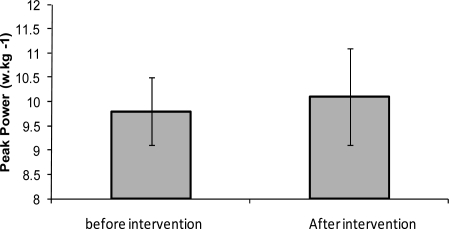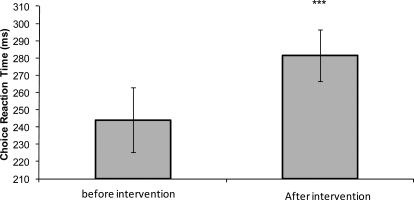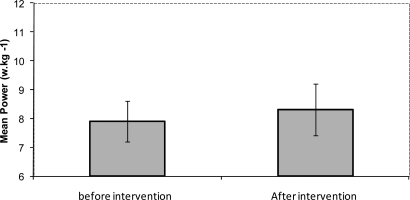Abstract
Purpose
The aim of this study was to determine the effect of one night's sleep deprivation on anaerobic performance and Reaction time of subjects in the morning of the following day.
Methods
Eighteen male college student athletes were studied twice in a balanced, randomized design. Subjects were measured for peak power, mean power and Reaction time.
Results
The performance showed no significant difference in both tests of anaerobic power (peak power, mean power) over the sleep deprivation period (P= 0.3; P= 0.4 respectively), but reaction time differed significantly from baseline (P=0.003). Results support the hypothesis that sleep serves a function of cognitive restitution, particularly in the maintenance of attentional mechanisms. In the light of the above considerations.
Conclusions
It was concluded that short-term sleep deprivation is not effective on anaerobic performance, but adversely affects cognitive function such as Reaction Time.
Keywords: Cognitive Function, Performance, Sleep Deprivation, Power, Athletes
INTRODUCTION
The main purpose of athletes and coaches is to achieve the optimal performance during sport events, so knowing about the important factors which have effects on athletic performances, is necessary. Sleep loss can have profound effects on human performance. In the laboratory setting, a variety of performance tasks have been shown to be affected by sleep deprivation [1–2].
Although athletes and coaches believe that adequate sleep is essential for peak performance, there are many situations (e.g. jetlag or anxiety) in which sleep is disturbed prior to an athletic event. Total sleep deprivation (TSD) has been shown to negatively affect many physiological, cognitive, and behavioral measures within the body [3].
Available literature points to sleep deprivation attenuating a person's ability to perform a variety of psychomotor tasks designed to measure neuromuscular function. Of the measures of psychomotor ability used to assess the effects of sleep deprivation, reaction times, both simple and choice are most frequently reported. For example, sleep deprivation has been associated with longer reaction times and reduced force on a simple and choice reaction time test [4]. Other studies have shown that sleep deprivation ranging from 30 to 64 h influences simple and choice reaction time significantly [5].
Similar results have been found for tasks that involve higher levels of cognitive functioning. That is, sleep deprivation results in decreased performance characterized by increased lapsing, cognitive slowing, memory impairment, decrease in vigilance and sustained attention and shift in optimum response capability [6,7]. It was shown in a study that there is a relationship between a decrease in levels of attention and total sleep deprivation [8]. Evidence suggests athletes worry about the effects of inadequate sleep on performance [9], although sleep deprivation on physical performance (e.g. anaerobic power, muscle strength, endurance, physiological responses such as heart rate, ventilation, and oxygen consumption) is not clearly understood [10–14]. Rodgers et al [12] reported that 48 hours period of sleep deprivation significantly decreased the physical work tasks requiring 30–45% VO2max without affecting anaerobic power. Further, Souissi et al [13] demonstrated that duration of sleepless period may be important as peak power was not affected after 24 hours sleep deprivation but significantly decreased after 36 hours of wakefulness. On the other hand, some studies suggested that sleep deprivation of up to at least 24 h has not been shown to influence physical performance capabilities like muscular strength, and cardiovascular and respiratory responses to exercise [13–15] while some studies suggested the temporal change of these abilities [16,17].
Reaction time and anaerobic power are two important factors affecting the performance of many sports, therefore this study was to investigate one night sleep deprivation (due to being epidemic among athletes) on anaerobic performance parameters such as peak power and mean power obtained from the 30-second Wingate Test and choice reaction time.
METHODS AND SUBJECTS
Participants
As the Wingate test requires maximum power, only physical education students who exercise regularly were considered and eighteen subjects were selected randomly among them. In addition just the males were included in the study in order to assure that the findings following sleep deprivation are not affected from gender differences [18]. Details of the study were explained to each participant and signed informed consents were obtained. The study was approved by the Ethics Committee of Tarbiat Modaress University, Tehran, Iran.
Study design
A self-administered questionnaire was used to assess age, weight, height, with their age of sports participation; and the amount of training per week (Table 2). All of the participants were asked to keep regular sleep-wake schedules for at least a 3-day period before coming to the laboratory. Participants’ time of going to bed varied between 10:00 p.m. and 11:00 p.m. The time of waking up varied between 07:00 a.m. and 08:00 a.m. All participants were non-smokers and they took no medication. Participants were also excluded if any of their first-degree relatives had a history of primary sleep disorder or major psychiatric illness. All had normal or corrected to normal vision. They were also required to fill out a sleep diary during the course of the experiment and refrain from taking naps during the day of the testing. Standard questionnaires were used to collect socio-demographic characteristics and sleep and medical history of each subject prior to the experiment.
Table 2.
Study design
| Time (hours) | pretest | Post test |
|---|---|---|
| 20:00 | Isocaloric dinner | Isocaloric dinner |
| 23:00 | Go to sleep | Reading newspaper |
| Watching TV | ||
| Playing Music | ||
| playing table games | ||
| 7:00–8:00 | Awaking of subjects and isocaloric breakfast | |
| 9:00–10:00 | Reaction time test | |
| 10:00–11:00 | Wingate test | |
| 10:00–12:00 | Habitual activities | |
| 12:00–13:00 | Isocaloric lunch |
Table 1.
General characteristics of participants (n=18)
| Variables | Mean (SD) | Range |
|---|---|---|
| Age (yrs) | 22.0 (1.12) | 20–23 |
| Height (m) | 1.77 (.05) | 1.71–1.83 |
| Weight (kg) | 71.1 (6.45) | 62–81 |
| BMI (kg m−2) | 22.7 (1.89) | 20–25 |
| Subjects background in sports (yr) | 6.2 (1.11) | 2–8 |
| Amount of training (h/week) | 5.42 (1.92) | 4–9 |
SD: Standard Deviation
The first part of the study was performed in the next day following the normal habitual sleep period. Following baseline measurements, participants remained awake whole night and day under the constant observation of two investigators in our laboratory. During the sleep deprivation period, the participants spent their time playing table games, reading books or watching television. They were restricted from taking caffeine, tea or other stimulants.
The protocol included two parts: (1) baseline measurements, (2) measurements following one night sleep deprivation (table 2). The first part of the study was performed in the next day following the normal habitual sleep period. Following Baseline measurements, participants remained awake whole night and day under the constant observation of two investigators in our laboratory. During the sleep deprivation period, the participants spent their time playing table games, reading books or watching television. They were restricted from taking caffeine, tea or other stimulants. The Wingate Test was performed for each participant at the same time period (10.00–11.00) of the following day.
Anaerobic test
The Wingate test consisted of a 30-second supramaximal cycling against a resistance load. Each test was performed on a Monark cycle ergometer (Model 894-E, Sweden) and for each participant the load was calculated as 0.090 kg x.kg−1 body mass. The participants warmed up by pedaling for 3 min against a 30 watt load. After a 5 min rest period, by the command “start” the participant began pedaling as fast as possible against a predetermined work load until the end of the test period. Strong verbal motivation was given to participants to maintain maximal pedaling rate during the test. The data were used to calculate peak power and mean power proposed by Bar-Or (1987).
Reaction Time test
The manual two-choice reaction task was performed by using a computer connected with two joysticks, fixed in front of the ergometer handlebars. Two empty squares (6 × 6 cm) were horizontally lined up on the center of the screen, adjusted to the subject's eye-level, drawn in yellow on blue. When one of the squares became filled with red, the subjects were asked to respond as quickly and accurately as possible by tilting the appropriate joystick. A warning signal appeared 1200 msec after the preceding response.
Statistical analysis
General characteristics of the participants were presented as mean ± standard deviations and range. Normality distribution of variables was tested using Kolmogorov Smirnov test. The effects of sleep deprivation on anaerobic power and reaction time were evaluated by paired t-test. The data were analyzed using the statistical functions of SPSS 17.
RESULTS
The statistical population was physical education students of Tehran University who exercise regularly and eighteen subjects were selected randomly. Graph 1 suggests the average mean power. It was revealed that the mean peak power of subjects exposed to sleep deprivation [8.3±1.6 w.kg−1] was not significantly changed compared to baseline [7.9±1.3 w.kg −1] (P>0.05).
Figure 2 suggests the mean peak power. It was revealed that the mean peak power of subjects exposed to sleep deprivation [10.1±2.2 w.kg −1] was not significantly changed compared to baseline [9.8±1.6 w.kg −1] (P>0.05). Figure 3 suggests the mean choice reaction time. It was revealed that the mean choice reaction time of subjects exposed to sleep deprivation [281.65± 31 ms] was significantly slower than baseline [244±39 ms] (P<0.005).
Fig. 2.
Mean peak power of subjects before and after intervention
Fig. 3.
Mean choice reaction time of subjects before and after intervention (*** P<0.005)
Fig. 1.
Mean power of subjects before and after intervention
DISCUSSION
This study was designed in such a way that any difference in reaction time and anaerobic power between conditions could be attributed to sleep deprivation. Since both conditions (pre-test and post-test) contained an identical protocol, it was possible to isolate the effects of sleep loss when Comparisons were made between conditions. The present study showed that performances of the Wingate tests were unaffected after subjects had experienced one night of sleep deprivation. No statistically significant alterations in anaerobic performance resulting from one night of sleep loss were found for both Mean and Peak power. These results agree in part with one previous report [19] after partial sleep deprivation.
A number of studies of short-term maximal efforts have also reported that supramaximal performance can be maintained under sleep deprivation. Takeuchi et al [20] showed that a sleep deprivation of 64 h had no effect on the times for the 40-m dash, or isometric strength and peak torque for leg extension at 3.14 and 5.22 rad/s. Symons et al [21] found that peak power output, mean power output, fatigue index and blood lactate after the Wingate test were not affected by sleep deprivation of at least 60 h. It seems that, there has been conflicting findings on the effect of sleep deprivation on physical performance. One of the reasons of this conflict may be examining the physical performance by different standardized physiological tests. Another reason of getting conflicting findings on the effect of sleep deprivation on physical performance may be the duration of sleep deprivation. In the light of above considerations, we suggest that short-term sleep deprivation is not effective on anaerobic performance. These results suggest that the processes underlying interference and facilitation in this task are insensitive to sleep deprivation; it may be that one night of sleep loss is not sufficient to affect these Processes. It should also be noted that the participants in these studies were young, healthy, and fairly well-rested prior to the sleep deprivation. It is possible that individuals with disrupted sleep, or those who chronically restrict their sleep like a majority of adults (National Sleep Foundation, 2005) might show greater interference effects from one night of sleep loss. Future studies with longer episodes of sleep deprivation, or in individuals who have more typical sleep durations prior to study may reveal an influence of sleep loss on interference and/or facilitation. One night of sleep loss slows down reaction time. Adrienne, et al (2010) [22] demonstrated that 51 h of sleep deprivation did not affect executive components of the task (working memory, scanning efficiency, and resistance to proactive interference), but did affect the non-executive component (reaction time intercept). Their results are similar to our present findings for the reaction time test. We found a strong effect of time awake on reaction time. The idea that executive function tasks are particularly sensitive to sleep deprivation stems from the finding that the frontal lobe is highly responsive to sleep loss. Additional studies involving more subjects, a more controlled environment, and/or a different variety of cognitive and physical tests are required in order to make conclusive assumptions about a larger population conclusively. Adequate sleep is essential for peak performance of those sports which need more cognitive functions (motor perceptual skills) and some unwillingly events (e.g. jetlag or anxiety) in which sleep is disturbed prior to an athletic event can impair the athletes performance.
CONCLUSION
It was found that anaerobic power (both peak and mean power) was unaffected following one night sleep deprivation, while a significant difference in RT was found after intervention. We found a strong effect of time awake on reaction time suggesting that cognitive functions such as Reaction time are more Vulnerable to be affected by sleep deprivation rather than physical abilities such as anaerobic power.
ACKNOWLEDGMENTS
We thank the study participants; Mr. Rezayi for coordinating the participant recruitment and screening; the technical, dietary, and Laboratory personnel of the physical education and sport science faculty of Tehran University, Dr. Kazemnejad for statistical advice; Dr. M. Dehkhoda for overall support. This study was supported by a grant from Tehran University.
Conflict of interests: None
REFERENCES
- 1.Killgore WD, Killgore DB, Day LM, et al. The effects of 53 hours of sleep deprivation on moral judgment. Sleep. 2007;30:345–52. doi: 10.1093/sleep/30.3.345. [DOI] [PubMed] [Google Scholar]
- 2.Lim J, Dinges DF. Sleep deprivation and vigilant attention. Annals NY Acad Sci. 2008;1129:305–22. doi: 10.1196/annals.1417.002. [DOI] [PubMed] [Google Scholar]
- 3.Miro E, Cano-Lonzao MC, Buela-Casal G. Electrodermal activity during total sleep deprivation and its relationship with other activation and performance measures. J Sleep Res. 2002;11:105–12. doi: 10.1046/j.1365-2869.2002.00286.x. [DOI] [PubMed] [Google Scholar]
- 4.Wlodarczyk D, Jaskowski P, Nowik A. Influence of sleep deprivation and auditory intensity on reaction time and response force. Percept Mot Skills. 2002;94:101–12. doi: 10.2466/pms.2002.94.3c.1101. [DOI] [PubMed] [Google Scholar]
- 5.Philip P, Sagaspe P, Moore N, Taillard J, et al. Fatigue, sleep restriction and performance in automobile drivers: a controlled study in a natural environment. Sleep. 2003;26:277–80. doi: 10.1093/sleep/26.3.277. [DOI] [PubMed] [Google Scholar]
- 6.DeGennaro L, Ferrara M, Curcio G, Bertini M. Visual search performance across 40 h of continuous wakefulness: measures of speed and accuracy and relation with oculomotor performance. Physiol Behav. 2001;74:197–204. doi: 10.1016/s0031-9384(01)00551-0. [DOI] [PubMed] [Google Scholar]
- 7.Himashree G, Banerjee PK, Selvamurthy W. Sleep and performance— recent trends. Indian J Physiol Pharmacol. 2002;46:6–24. [PubMed] [Google Scholar]
- 8.Zerouali Y, Jemel B, Godbout R. The effects of early and late night partial sleep deprivation on automatic and selective attention: An ERP . Brain Res. 2010;1308:87–99. doi: 10.1016/j.brainres.2009.09.090. [DOI] [PubMed] [Google Scholar]
- 9.Leger D, Metlaine A, Choudat D. Insomnia and sleep disrup-tion: Relevance for athletic performance. Clin Sports Med. 2005;24:269–85. doi: 10.1016/j.csm.2004.12.011. [DOI] [PubMed] [Google Scholar]
- 10.Martin BJ. Effect of sleep deprivation on tolerance of prolonged exercise. Eur J Appl Physiol Occup Physiol. 1981;47:345–54. doi: 10.1007/BF02332962. [DOI] [PubMed] [Google Scholar]
- 11.Martin BJ. Sleep deprivation and exercise. Exerc Sport Sci Rev. 1986;14:213–29. [PubMed] [Google Scholar]
- 12.Rodgers CD, Paterson DH, Cunningham DA, et al. Sleep deprivation: effects on work capacity, self-paced walking, contractile properties and perceived exertion. Sleep. 1995;18:30–8. doi: 10.1093/sleep/18.1.30. [DOI] [PubMed] [Google Scholar]
- 13.Souissi N, Sesboue B, Gauthier A, et al. Effects of one night's sleep deprivation on anaerobic performance the following day. Eur J Appl Physiol. 2003;89:359–66. doi: 10.1007/s00421-003-0793-7. [DOI] [PubMed] [Google Scholar]
- 14.Youngstedt SD, O'Connor PJ. The influence of air travel on athletic performance. Sports Med. 1999;28:197–207. doi: 10.2165/00007256-199928030-00004. [DOI] [PubMed] [Google Scholar]
- 15.VanHelder T, Radomski MW. Sleep deprivation and the effect on exercise performance. Sports Med. 1989;7:235–47. doi: 10.2165/00007256-198907040-00002. [DOI] [PubMed] [Google Scholar]
- 16.Bougard C, Lepelley MC, Davenne D. The influences of time of-day and sleep deprivation on postural control. Exp Brain Res. 2011;209:109–15. doi: 10.1007/s00221-010-2524-8. [DOI] [PubMed] [Google Scholar]
- 17.Reilly T, Atkinson G, Edwards BW, et al. Diurnal variation in temperature, mental and physical performance, and tasks specifically related to football (soccer) Chronobiol Int. 2007;24:507–19. doi: 10.1080/07420520701420709. [DOI] [PubMed] [Google Scholar]
- 18.Caldwell JA, Leduc PA. Gender influences on performance, mood and recovery sleep in fatigued aviators. Ergonomics. 1998;41:1757–70. doi: 10.1080/001401398185956. [DOI] [PubMed] [Google Scholar]
- 19.Mougin F, Bourdin H, Simon-Rigaud ML, et al. Effects of a selective sleep deprivation on subsequent anaerobic performance. Int J Sports Med. 1996;17:115–9. doi: 10.1055/s-2007-972818. [DOI] [PubMed] [Google Scholar]
- 20.Takeuchi L, Davis GM, Plyley M, et al. Sleep deprivation, chronic exercise and muscular performance. Ergonomics. 1985;28:591–60. doi: 10.1080/00140138508963173. [DOI] [PubMed] [Google Scholar]
- 21.Symons JD, VanHelder T, Myles WS. Physical performance and physiological responses following 60 hours of sleep deprivation. Med Sci Sports Exerc. 1988;20:374–80. doi: 10.1249/00005768-198808000-00008. [DOI] [PubMed] [Google Scholar]
- 22.Adrienne M, Tucker Paul Whitney, et al. Effects of Sleep Deprivation on Dissociated Components of Executive Functioning. Sleep. 2010;33:47–57. doi: 10.1093/sleep/33.1.47. [DOI] [PMC free article] [PubMed] [Google Scholar]





